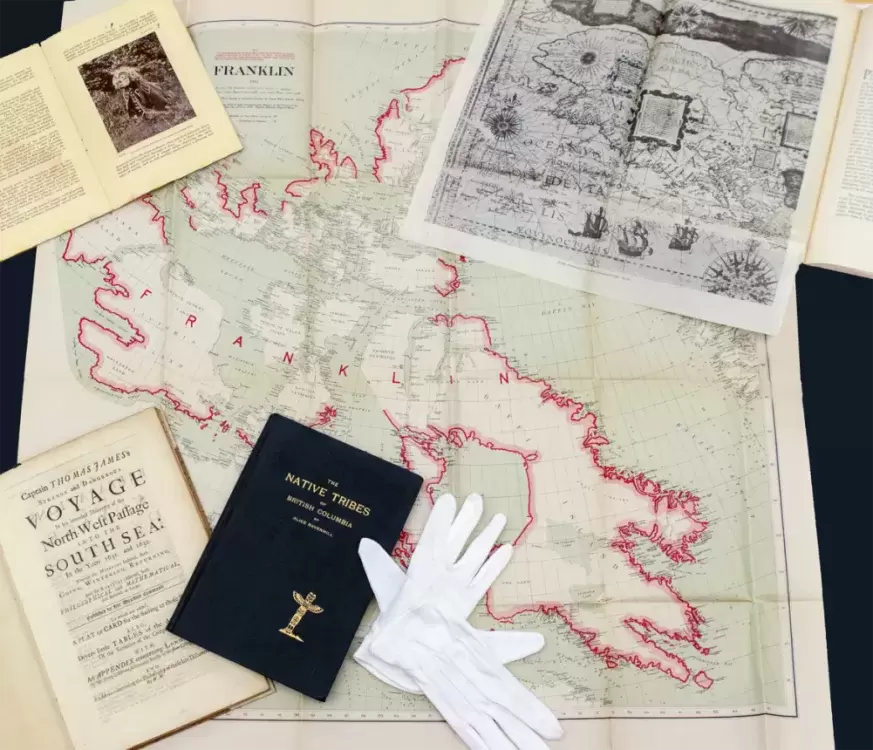Margaretta James is thrilled Indigenous voices will be sought for a project being undertaken at the Vancouver Island University (VIU).
Thanks to a recent grant, university officials will soon begin to digitize historical texts and maps from Canada’s early colonial period. The university’s library features 38 historic texts and a half dozen maps in its Special Collections. This material, which includes naval expeditions along the Northwest Passage, has never been digitized. The collection includes narratives of the journeys people took in the land which became Canada.
James, a member of the Mowachaht/Muchalaht First Nation, is thrilled VIU officials will seek input from Indigenous people to include in its digitized efforts.
“A lot of our documentation has been through a European lens and not an Indigenous lens,” said James, who is the president of the Land of Maquinna Cultural Society. “It’s important to have that as well.”
Digitizing the texts and maps in VIU’s collection will cost $65,000. The venture will move forward thanks to a $17,015 grant the school received. The university will cover the remaining expenses.
The grant was made possible because of a $1 million anonymous donation to the National Heritage Digitization Strategy (NHDS). By joining forces with the Libraries and Archives Canada, the NHDS then put out a call for applicants to receive funding to digitize collections in order to preserve Canada’s cultural heritage.
It was suggested that applications have a unique initiative and also one of national significance. There was an overwhelming response. A total of 213 applications were received from across the country. And 21 of those applicants were eventually chosen to be awarded grants of various amounts.
VIU ended up being one of the lucky grant recipients.
“There were just three award winners in B.C.,” said Ben Hyman, VIU’s chief librarian. “We were surprised to be chosen. And we’re really happy to be included in this.”
Hyman added VIU officials had requested $19,000 in their grant application. Though the university did not receive the exact amount it had requested, Hyman said school reps were not disappointed at all. Instead, they were rather pleased they did get the majority of the funds that they were seeking for their digitized project.
It is expected to take until next August to complete the digitization of VIU’s historical texts and maps.
Prior to that Hyman said school officials will be reaching out to various Indigenous communities to hopefully seek individuals who will be able to offer their perspectives of the work being digitized. Since VIU has campuses in Nanaimo, Powell River and Duncan, Hyman said elders from those communities will in all likelihood be the first ones to be approached to see if they would like to contribute their input.
“We will connect with them and see if they have an interest in participating and how they will participate,” Hyman said.
Hyman added Nuu-chah-nulth individuals from various First Nations could also be potentially sought to see if they have a desire to take part in the digitization process. Hyman though is not quite sure what the final product, including Indigenous perspectives, will look like. Indigenous voices will be sought on some, not all, of the items that VIU officials will digitize.
“We see it as an essential component,” Hyman said. “But honestly we don’t know what it will look like yet. It depends on the number of folks we get.”
James believes VIU should have no problems finding Indigenous people who are willing to assist with the project. She said in the past Indigenous people were silenced and not keen on discussing their past. But those days have changed.
“We’re pretty small but there are a few of us that are vocal,” she said. “We can write and we can offer our voice. Right now we’re looking into a different era.”
The VIU library also received another grant earlier this year to assist with its digitizing efforts.
It was given $40,000 to digitize issues from local newspapers. Those funds were used to place online issues of the Nanaimo Daily Free Press from 1874 through 1928 and the Cowichan Leader, starting with publications from 1905 and up to 1928.







